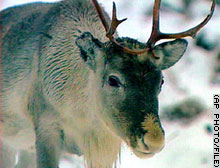Entered into the database on Tuesday, November 22nd, 2005 @ 15:22:53 MST
Life is harsh on the freezing tundra of the Arctic Circle where Anna
Prakhova lives. But it can be much harder when snows do not fall. In recent years, snows have failed to fall as normal across large parts of
the barren land dotted with low birch and pines. "We are experiencing the reality of climate change," Prakhova, who
leads a group representing indigenous people in Russia and the Nordic nations,
said on a snow-free day in Harstad, a Norwegian Arctic port of about 15,000
people. Evidence that humans are pushing up global temperatures is growing ever stronger,
ranging from a shrinking of ice in the Arctic to a warming of the Indian Ocean,
many experts say. The scientific panel that advises the United Nations looks likely to issue
sterner warnings in its next report in 2007 that emissions of heat-trapping
gases from power plants, factories and cars are disrupting the climate, they
say. And mounting conviction among experts may add pressure on governments, who
next meet for climate talks in Montreal, Canada, from Nov. 28 to Dec. 9, to
do more about a problem that could cost trillions of dollars to fix in coming
decades. Are we to blame? "There is stronger and stronger evidence that there is an anthropogenic
(human) element affecting the climate," said Paal Prestrud, head of the
Center for International Climate and Environmental Research in Oslo. The 10,000 delegates to the Montreal talks will discuss how to fight climate
change, especially after 2012 when the U.N. Kyoto Protocol on curbing greenhouse
gas emissions runs out. Prakhova is more worried about what is happening now. She said reindeer, traditionally herded by Sami people -- who live in Russia,
Finland, Sweden and Norway -- were vulnerable when winter snows did not fall. "Snow is cold for us but for reindeer it is a soft winter bed," said
Prakhova, a Russian Sami. Lack of snow also makes it hard for reindeer to feed
on lichen because the plants can get covered by sharp ice, which cuts their
soft muzzles. In September, polar ice contracted to its smallest size in at least a century,
according to measurements by space agency NASA and the U.S. National Snow and
Ice Data Center. Around Harstad, less bone-chilling winters have helped some pests to thrive,
like beetles and worms that destroy Arctic forests. In northern Russia, frogs
have been spotted more often on the tundra and some birds are not even bothering
to migrate. The idea that humans are to blame is growing: A survey this year by scientists
at the U.S. Scripps Institution of Oceanography showing a warming of the Pacific,
Atlantic and Indian oceans over recent decades has been among the strongest
evidence that human activities are responsible. The Intergovernmental Panel on Climate Change (IPCC), of scientists who advise
the United Nations, concluded in its last report in 2001 that: "There is
new and stronger evidence that most of the warming observed over the last 50
years is attributable to human activities." Most research since 2001 has downgraded theories that swings in the power of
the sun, volcanic dust or warmth from cities are mainly to blame for rising
temperatures, rather than emissions of carbon dioxide from burning fossil fuels. "Based on new research, which is already available in the journals, we
can say that there is stronger evidence about the human influence" on the
climate, said Albert Klein Tank of the Royal Netherlands Meteorological Institute.
He is among scientists working on the next IPCC report, due in 2007. Guessing game But there is still huge uncertainty about the impact of warming. IPCC reports
say climate change might bring more powerful hurricanes, heatwaves, droughts
and raise sea levels by almost a 3 feet by 2100. Other scientists say humans will be able to adapt, arguing that IPCC models
may be wrong. They point, for instance, to a lingering dispute about whether
temperatures are rising more slowly higher in the atmosphere than at the surface. "I don't see the catastrophic effects from warming that others predict,"
said John Christy, a professor at the University of Alabama in Huntsville who
says satellite data since 1979 shows temperatures rising fastest at the surface. "All I can offer is guesses," he said of the temperature discrepancy.
"Perhaps as the surface warms the atmosphere has a capacity to release
warmth to space in a way the climate models don't take into account." Environmentalists say that any suggestion that humans are causing warming "beyond
a reasonable doubt" might spur lawsuits against nations accused of doing
too little. Environmentalists often single out the United States and Australia
as laggards. Those two countries are the main rich nations outside Kyoto, which demands
cuts in emissions of 5 percent below 1990 levels by 2008 to 2012. Nations will
have to curb fossil fuel use and shift to clean energy like wind or solar power. President George W. Bush pulled out in 2001, arguing that Kyoto would be too
costly and wrongly excluded poor nations from a first round of cuts. He says
more research is needed and is investing heavily in technology like pollution-free
hydrogen. There is growing evidence that time is of the essence, especially for people
like Prakhova who live on the front-line of climate change. A report by 250 experts late last year said that the Arctic was warming twice
as fast as the rest of the globe. That could push polar bears towards extinction
and leave the Arctic Ocean ice-free in summers by 2100.
